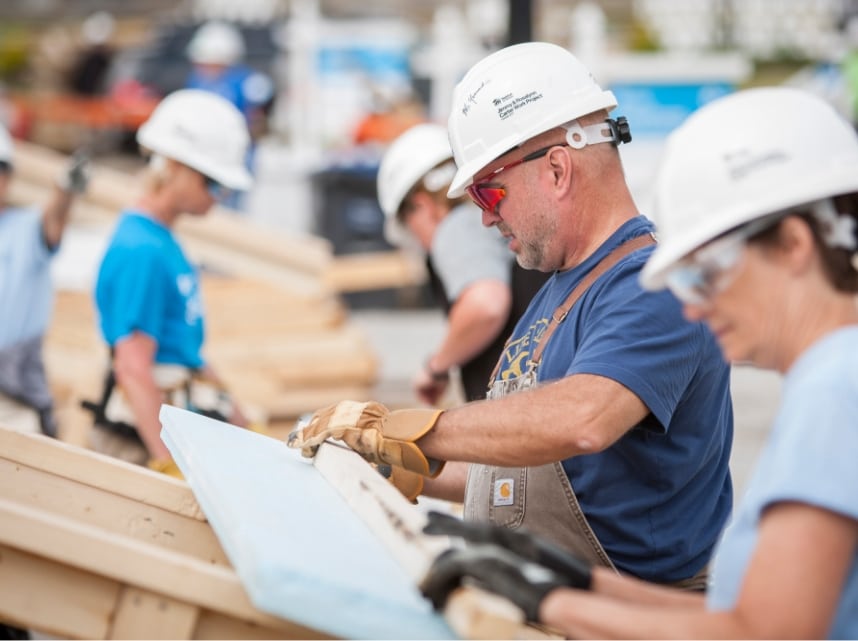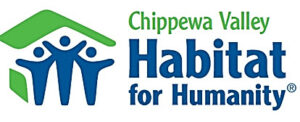
Toolbox Resources
Resources, documents and forms for program participants, contractors and volunteers.
Construction Manual
2022 CONSTRUCTION MANUAL IS NOW AVAILABLE!
All changes are denoted by the usual change indicator (‘|’) in the left margin and the changed or added text in red. A summary of a few of the changes are outlined below (not a complete list so be sure to check out all the chapters for the all the changes for this year):
- General Changes
- We continue to move away from “brand name” references (i.e., RotoZip, Paslode, Weathermate, etc.,) so note the following changes:
- RotoZip replaced with spiral saw
- Timber Lok replaced with Timber screws
- Tapcons replaced with Concrete screws
- Shims, spacer updates for simplification and consistency:
- Shimming, shim or shims will now refer to using a combination of spacers and shims. To simplify everything will be referred to as a “shim”. The only spacer references remaining will be in non-shimming situations.
- We use four kinds of shims:
- flat wood shims (formerly wood spacers)
- flat cardboard shims (formerly cardboard spacers)
- flat metal shims (formerly metal spacers)
- tapered shims (formerly shim or wood shims)
- If a dimension is critical to describe the shim it will be included in the description above (e.g., 3″x5″ Flat wood shims)
- Chapter Highlights (not a complete list):
- Chapter 5:
- Major clarifications on wall sheathing nailing patterns for OSB (both wind bracing and non-wind bracing) panels and foamboard
- Chapter 8:
- Has been archived and no longer part of the Construction Manual (to save paper when printed) (although still available under the ARCHIVED chapters section)
- Chapter 10:
- Several blocking updates
- Chapter 9:
- Many window changes, the main one being a procedure added for using Flashing tape to protect the Sill if sill pans are not available
- Several exterior door updates
- Chapter 12:
- Several air sealing changes to ensure we are following local codes
- Chapter 16:
- Stair tread and riser installation changes
- Chapter 17:
- New cabinet installation sections for the Built-In and “barista” cabinet installs
- Chapter 23:
- Major upgrades to garage layout and framing
Below is a short description of Quick Reference & Quality Point Guides and their intended use on the build site:
- Quick Reference Guides (QR’s) are a one-page summary of steps for performing a specific task (e.g. Installing Interior Doors & Trim). QR’s are strictly a “what to do” guide or checklist and are designed for individuals who are comfortable and well versed in the task but just need a reminder of “what to do” (vs. “how to do it”).
- Quality Points (QP’s) help volunteers by providing the expectations for each task as it is performed and completed. QP’s also function as a checklist to review before acknowledging the task is complete.
If you have any questions or concerns with the Construction Manual, please contact Kevin Gostomski, Construction Supervisor at KevinG@FoxCitiesHabitat.org or (920) 205-1051.
View or Print Construction Manual
- Construction Manual
- Quality Points Guide
- Chapter 1: Beam and Still Plates
- Chapter 2: Cap Foundation
- Chapter 3: Wall Layout
- Chapter 4: Components and Stairs
- Chapter 5: Build Main Floor Walls
- Chapter 6: Porch, Stairway and Basement Walls
- Chapter 7: Roof Framing
- Chapter 8: Roofing
- Chapter 9: Windows and Exterior Doors
- Chapter 10: Vents, Baffle Guard and Blocking
- Chapter 11: Siding and Soffit
- Chapter 12: Sealing and Insulation
- Chapter 13: Ceiling Sheetrock
- Chapter 14: Wall Sheetrock
- Chapter 15: Painting
- Chapter 16: Subfloor, Dricore and Finish Stairs
- Chapter 17: Cabinets
- Chapter 18: Interior Doors
- Chapter 19: Interior Finish Work
- Chapter 20: Exterior Finish Work
- Chapter 21: Final Finish Work
- Chapter 22: Shed Construction
- Chapter 23: Garage Construction
- Chapter 24: Picnic Table Construction
Safety Manual
Greater Chippewa Valley Area Habitat for Humanity takes safety very seriously. It is our number one priority to keep all of our volunteers, contractors and staff out of harm’s way at all times.
This 2022 Safety Manual was written as a guideline to work safely on site. Common sense should be used at all times. If at any time you feel unsafe or that something isn’t right, stop what you are doing immediately and talk to a staff member or site leader.
Mission of this manual:
- To create safety awareness and a safe working environment for all Habitat volunteers and staff.
- Construction can be a hazardous activity. It is expected that the Greater Chippewa Valley Area Habitat for Humanity construction process will be completed without any accidents.
Construction Bid
Greater Chippewa Valley Area Habitat for Humanity provides a wide range of housing solutions to low-income individuals and families in our area.
On average each year we complete 18 new construction and rehab homes in partnership with families through our Homebuyer program and around 50-60 projects in partnership with existing homeowners. Each year, we host a bid process for contractor and material supplier bids for the upcoming build season. For certified lead contractors, Chippewa Valley Habitat also has lead projects that are available for bidding.
Thank you for your consideration of our projects located in the Chippewa Valley. Greater Chippewa Valley Area Habitat for Humanity is a non-profit organization created to provide affordable housing for low-income, hard-working families.
A Certificate of Insurance is required.
General Liability:
Required Coverage and Limits:
$1,000,000 Each Occurrence
$5,000 Medical Expense
$1,000,000 Personal & Advertising Injury
$1,000,000 General Aggregate
$1,000,000 Products/Completed Operations Aggregate
Name Habitat as an Additional Insured with respect to work performed
Auto Liability:
Required Coverage & Limits:
$1,000,000 Combined Single Liability per Occurrence Limit, or
$1,000,000 Bodily Injury Liability Limit and
$1,000,000 Property Damage Liability Limit
Umbrella Liability:
Required Coverage & Limits:
$1,000,000 Each Occurrence
$1,000,000 Aggregate
$10,000 Self-Insured Retention
Workers’ Compensation
Required Coverage & Limits:
$100,000 Per Occurrence Employer’s Liability Limit
$100,000 Employer’s Liability Disease/Employee
$500,000 Employer’s Liability Disease Policy Limit
Bidding Process
The link below provides a building plan to base your bids from.
We are accepting bids for approximately 18 projects per year for the following project types:
Contractor Bids:
Excavation, roofing, plumbing, heating, insulation, flatwork, plaster, landscape, gutters and down spouts.
General Supplier Bids:
Trusses, windows, doors, drywall, siding, cabinets, countertops, flooring.
Completed paperwork and bids should be submitted using the info below, and addressed to Roger Roth, Director of Construction or Howie Fuerst, Construction Supervisor.
Questions can be directed to Roger Roth at RogerR@foxcitieshabitat.org.
Bids can be sent by:
Mail: 921 Midway Road, Menasha, WI 54952
Email: RogerR@foxcitieshabitat.org or HowieF@foxcitieshabitat.org
Fax: 920-954-8390
Lead Project Bids
GFCA Habitat for Humanity, Inc., through a Lead Grant with DHS works with owners, certified contractors and community organizations to provide lead abatement services to qualified area homeowners. These are residential projects and consist of a variety of interior and exterior work. We regularly have residential lead projects available for bidding. If you are interested in providing an estimate please contact us for a current listing of available projects.
All companies that are credentialed with the State of Wisconsin Department of Health services to perform lead abatement work are encouraged to submit bids for available projects. GFCA Habitat for Humanity, Inc., has funding for construction companies and individuals that would like to secure training leading to certifications in lead abatement work.
For more information please contact Paul Draxler via email at pauld@foxcitieshabitat.org or phone at 920-277-0227.
Auto Pay Form
Use the auto pay form to sign up or make changes to your mortgage or loan payments each month. Return the completed form, with signature, to the Greater Chippewa Valley Area Habitat for Humanity office.
Greater Chippewa Valley Area Habitat for Humanity
921 Midway Road
Menasha, WI 54952
Homeowner Education
Habitat’s overall goal is to empower families to become knowledgeable and successful homeowners. As a part of Chippewa Valley Habitat’s sweat equity component, each partner family completes several required homeowner education classes. These classes are designed to prepare families for financial responsibilities of becoming homeowners, how to best maintain their homes and acclimate into their new neighborhoods.
Classes and workshop are taught by Chippewa Valley Habitat staff and volunteer facilitators. Please note that total class time may vary depending on language needs and providing interpreters.
Education Checklist
Classes opportunities offered online:
H&HS E Cigs: https://youtu.be/iK-MoCcCbQU
H&HS Fire: https://youtu.be/kziq6cLXsE8
H&HS Police: https://youtu.be/Z_Hx7IiYAcM
H&HS Mental Wellness: https://youtu.be/1fqpnlRc9Qw
Grass Class Lawn Visit: https://youtu.be/FnfeYhP-zmU
Grass Class Classroom: https://youtu.be/iY5Q5TWCfoY
Grass Class Kruegers: https://youtu.be/c4EIdRg-CEw
Good Neighbor with Cues: https://youtube.com/watch?v=f3KhYYmJh8c
Construction Basics: https://youtu.be/KyvelVDtDUY
Homeowner Construction Basics 101
Construction Basics 101 equips newly approved homebuyers for their first day on a build site. This course is offered multiple times per year, and is a combination of classroom and hands-on learning.
The course covers a broad range of topics:
- How a typical build day operates
- Roles people play
- How their house gets built
- Hand and power tool usage
- Safety
- Terminology
- Measuring basics
View the construction training course catalog.
If you have any questions on this training program, contact Construction Supervisor Kevin Gostomski at 920-205-1051 or via email at KevinG@foxcitieshabitat.org.
Sweat Equity
Sweat equity is the unpaid labor invested by homeowner partners in building their own and other Chippewa Valley Habitat houses. This has been expanded to include homeowner workshops, community service, working at the Appleton Habitat ReStore and other work that may serve the Affiliate or improve homeowner skills. Sweat equity increases the personal stake of each family member in the home, fosters partnership with Chippewa Valley Habitat and is a key principle of Habitat in building partnerships across economic, racial and national divisions.
Each Chippewa Valley Habitat homeowner in our homebuyer program completes a minimum of 300-500 hours of sweat equity prior to purchasing and moving into their Habitat home. Families with one parent or adult are required to have a minimum of 300 hours of sweat equity. Families with two or more adults are required to complete 500 hours of sweat equity.
Volunteer Training
Senior Crew Volunteers
For our volunteers who sign up for Senior Crew AND commit to a regular schedule, we offer a range of training opportunities. The 101, 201, and 301 level courses are generally held during February/March of each year at our Education Center and Warehouse.
Each course has detailed training plans, goals, tools, materials, quality points and more to ensure a complete learning opportunity.
All 201 and 301 courses are held at our Warehouse for hands-on training on a 10′ x 16′ model house where trainees can install interior doors, windows, siding, soffit, insulation and sheetrock.
General Volunteers
For those that are not part of our Senior Crew, we offer on-site training every build day for all experience levels. The only requirement is the desire to learn and help our Habitat families build their future. Learn more about volunteering.

